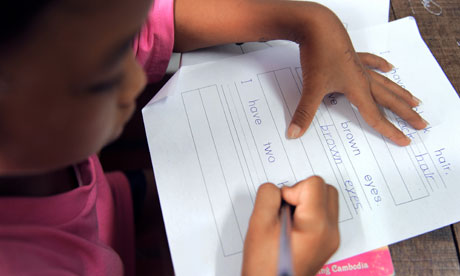
English courses in Cambodia are taking steps to ensure learning materials reflect their pupils' lives. Photograph: Tang Chhin Sothy/AFP
Taking care to research and respect other cultures helps prevent embarrassing faux pas
Daniel Murphy
Guardian Weekly,
Tuesday 19 July 2011
As a volunteer, I have tried to learn how my behaviour might cause offence (shoes in the house, giving money with the left hand). I have been both chastened and amused by stories of cultural faux pas. Most memorable is the apocryphal tale of the Peace Corps volunteer caught short shortly after arriving at an Asian friend's house who asked for the "wash room". Once inside, seeing just a water tub with a scoop for bathing, he could do no other than deposit an unwanted parcel in the drain channel in the corner of the room. The drain led out through a small hole in the wall and so, by pouring water from the tub and prodding a little, he managed to get rid of the offending item. Only later did he discover that the drain led into the kitchen, where the women of the family were appalled.
However, cultural sensitivity is not just about individual actions. Being from the west, one inevitably falls heir to an entire history of cultural insensitivities, nowhere more so than in language, where English constantly infiltrates and seduces. I see it in my day-to-day work, part of which involves helping to develop the English language curriculum in primary schools. I justify my actions by arguing that avoiding English is not an option for Cambodian children, that knowledge of the language will empower them. I take some comfort from the essay Politics and Politicians of African Literature, in which Chinua Achebe provides a far stronger defence than I ever could of the continuing value of the English language in Africa, despite its colonial origin. I also am pleased that the materials for teaching English in Cambodian schools that I promote aim to avoid the cultural insensitivity of previous texts, which carried the message that a certain British way of life was an aspirational norm.
My pleasure was increased when I saw the equivalent French texts. The authors unashamedly promote the French way of life – a calendar of French holidays, photos of French towns, descriptions of how French people spend their leisure time. "Which part of the concept of neo-colonialism do these French authors not understand?" I asked myself. But such feelings of moral superiority offer only temporary relief. For good and for ill, the English language is an agent of globalisation. I cannot feel comfortable about all that English inevitably brings in its train.
Taking care to research and respect other cultures helps prevent embarrassing faux pas
Daniel Murphy
Guardian Weekly,
Tuesday 19 July 2011
As a volunteer, I have tried to learn how my behaviour might cause offence (shoes in the house, giving money with the left hand). I have been both chastened and amused by stories of cultural faux pas. Most memorable is the apocryphal tale of the Peace Corps volunteer caught short shortly after arriving at an Asian friend's house who asked for the "wash room". Once inside, seeing just a water tub with a scoop for bathing, he could do no other than deposit an unwanted parcel in the drain channel in the corner of the room. The drain led out through a small hole in the wall and so, by pouring water from the tub and prodding a little, he managed to get rid of the offending item. Only later did he discover that the drain led into the kitchen, where the women of the family were appalled.
However, cultural sensitivity is not just about individual actions. Being from the west, one inevitably falls heir to an entire history of cultural insensitivities, nowhere more so than in language, where English constantly infiltrates and seduces. I see it in my day-to-day work, part of which involves helping to develop the English language curriculum in primary schools. I justify my actions by arguing that avoiding English is not an option for Cambodian children, that knowledge of the language will empower them. I take some comfort from the essay Politics and Politicians of African Literature, in which Chinua Achebe provides a far stronger defence than I ever could of the continuing value of the English language in Africa, despite its colonial origin. I also am pleased that the materials for teaching English in Cambodian schools that I promote aim to avoid the cultural insensitivity of previous texts, which carried the message that a certain British way of life was an aspirational norm.
My pleasure was increased when I saw the equivalent French texts. The authors unashamedly promote the French way of life – a calendar of French holidays, photos of French towns, descriptions of how French people spend their leisure time. "Which part of the concept of neo-colonialism do these French authors not understand?" I asked myself. But such feelings of moral superiority offer only temporary relief. For good and for ill, the English language is an agent of globalisation. I cannot feel comfortable about all that English inevitably brings in its train.

No comments:
Post a Comment